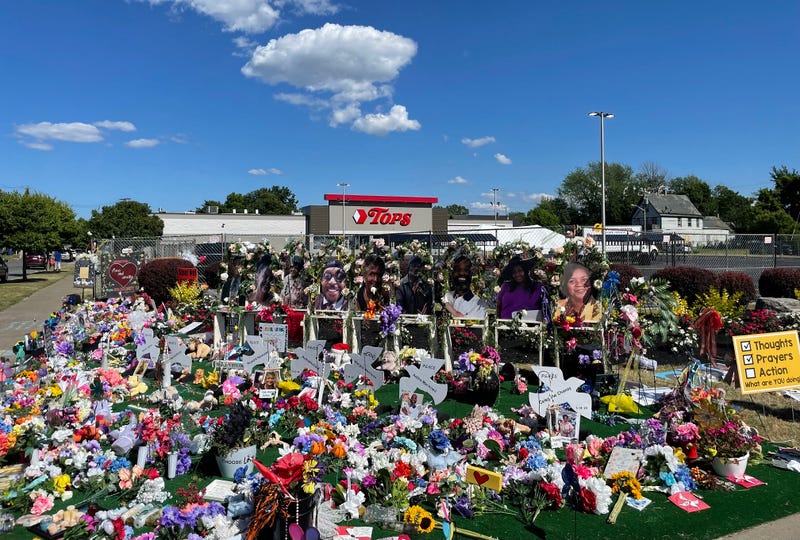
Buffalo, N.Y. (WBEN) - Wednesday is sentencing day for the 19-year-old Tops mass shooter in state court in Downtown Buffalo, where he is already set to serve life in prison without the possibility of parole.
Payton Gendron pleaded guilty to all 25 counts he faced at the state level back on Nov. 28, 2022, and sentencing day is the final process in the case against him at the state level.

Although it's already known Gendron will serve the rest of his life in prison without parole, Wednesday will be an opportunity for the victims' families to speak directly to Gendron after he killed 10 Black people and wounded three others in a racially motivated shooting.
"It's going to be a lengthy day, because all of the victims' families in this case are allowed to speak, and several of them have indicated that they're going to exercise their right to speak," said Attorney John Elmore, who represents three of the families who lost loved ones during the May 14 shooting. "It's going to be a very emotional time where victims will face Mr. Gendron, and tell him about the pain and infliction that the senseless act has caused their family. I think some of them will be very angry, some will be very emotional."
"There will be a significant amount of time devoted to hearing what the family members have to say," added Attorney Terry Connors, who represents seven of the 10 families who lost loved ones in the shooting. "Some of them may decline, because it's just too emotional. It's just too tough for them to be re-victimized by the actual proceeding, and to live through that horrific day that they experienced on May 14."
Once the families have gotten their chance to speak and address Gendron during the sentencing, his lawyers will then make a statement on his behalf, and the judge will then sentence him to life in prison without parole.
Among the families that will be speaking during Wednesday's sentencing is the family of Zaire Goodman. The 21-year-old was one of the three people who were wounded during the attack, but managed to survive.
"I will definitely be speaking on Wednesday," said Zeneta Everhart, mother of Goodman. "Zaire and I work together on a victim impact statement that I will be reading. So me and Zaire, and our whole family will be there on Wednesday."
While Goodman is not set to speak during Wednesday's sentencing, this will be the first time he will be present at any court proceeding for Gendron either at the state or federal level.
As Everhart details, her son continues to progress as good as can be expected. She continues to be grateful for his life, and that he still remains here with her family.
"It's gonna be a long road, a long road to recovery for him not just physically, but mentally. And a part of Wednesday goes into that healing, and it's going to be a hard day for him," Everhart said. "It's just compounded on everything else that he's had to deal with, and now being in court and facing the terrorist that tried to kill him. It's hard, it's heartbreaking, but it's a part of this process, and I'm so proud of Zaire just for the way that he's handled all of this.
"I am not the one who was injured, but I've done his voice throughout all of this. Obviously I know firsthand how he's feeling about all of this, and it's a lot. It's a lot for a 21-year-old to have to grapple with all of this. But he knows that he's supported by his family and by the community."
Also set to be in attendance for Wednesday's sentencing of Gendron is Buffalo Mayor Byron Brown, who will be joined by Buffalo Police Commissioner Joseph Gramaglia.
"My wife, Michelle, and I continue to pray for the family members of those who were killed in the senseless shooting at the Tops on Jefferson Avenue on May 14," said Brown in a written statement on Tuesday. "These families lost so much, and our hearts continue to be with them. This day is not a day of celebration, but another day that calls out for justice and strengthens our resolve to continue our mission to end the gun violence that is plaguing Buffalo and cities across the country."
As the mayor and others will be in attendance to support the families of the victims of the May 14 shooting, there will be some family members and others who will be able to experience some solace for there being a resolution to the horrific tragedy. However, it's still a difficult conversation to be had, with a lot of other things to think about while addressing the shooter.
"These events can be triggers for the families involved, certainly, but also for the rest of the community - I think we have to use the word 'community' in the most broadest sense," said Dr. Michael Cummings, Associate Medical Director of Erie County Medical Center. "Over the years, we used to talk about trauma only being sort of relevant if it directly affected you or directly affect your loved one, or you witnessed it. But with the age of the Internet, TV and everything else, the concept of vicarious trauma and how it can affect the community on a local, state, national level. So there's going to be a lot of challenges, I think, for a lot of people, even though the resolution to this court case will be occurring. I expect it will be particularly difficult for the families involved."
With Wednesday's sentencing of Gendron coming just after the nine-month mark of the racially motivated shooting in East Buffalo, Dr. Cummings can imagine it will be an unnerving situation for many of the families set to speak directly to the shooter.
"I imagine will be incredibly difficult," he said. "I imagine it will be an emotionally-charged event, and one of the things to consider is, yes, there'll be a resolution, but there's a lot of energy focused particularly from victims, loved ones of victims, people directly affected by this heinous crime that when the court case is over, the question becomes, 'What do you do with that energy and focus?' Because that won't go away just because the end of the trial and sentencing has occurred. So it's gonna be a challenge."
While people handle these types of situations in different ways, some may see this sentencing on Wednesday as some form of closure by directly addressing Gendron, allowing for their voices to be heard months after the fact.
"If you look at the literature around this - by literature, I mean the scientific literature and study - there's a lot written and not a lot of consensus, because every situation is so different. Every family is so different," Dr. Cummings explained. "I think having, what we expect, the outcome of the plea in the sentencing to be, there, perhaps, will be some solace of the perpetrator of this crime has received the maximum allowable sentence that could occur. I think that will probably provide some sense of closure to some people involved, but a loss of a loved one, particularly under these circumstances, is something that is a lifelong journey for people. So while the end of the case may bring some closure, there's a lot of work left to be done."
While that doesn't necessarily mean it has to be done with the assistance of mental health professionals, Dr. Cummings says it can be done with natural supports like families, loved ones, members of church, wherever people feel like they can be heard and feel safe while they share what they're going through. It's also a process that will not just end come Wednesday when speaking to Gendron in the court room.
"I think it's important for people who want to be heard to have that venue to be heard. It's empowering to be able to say things that you've been feeling and thinking, and being able to say them in a public venue," he said. "For other people, that may not be what they want to do, and that's OK, as well. I think we have to respect each individual and each family's wish in situations like this, and then be there to support them. But remember, situations like this reinvent themselves over the weeks, months, years to come in the future, so when the media coverage of an event like this goes away, the torn up families and the results - psychiatrically, emotionally - to the individuals directly affected do not. They may need support for days, weeks, months, years into the future, and our job is to lend that support and be there for them in a way that's helpful to them."
Hear more of Dr. Cummings' conversation with WBEN available in the player below:


